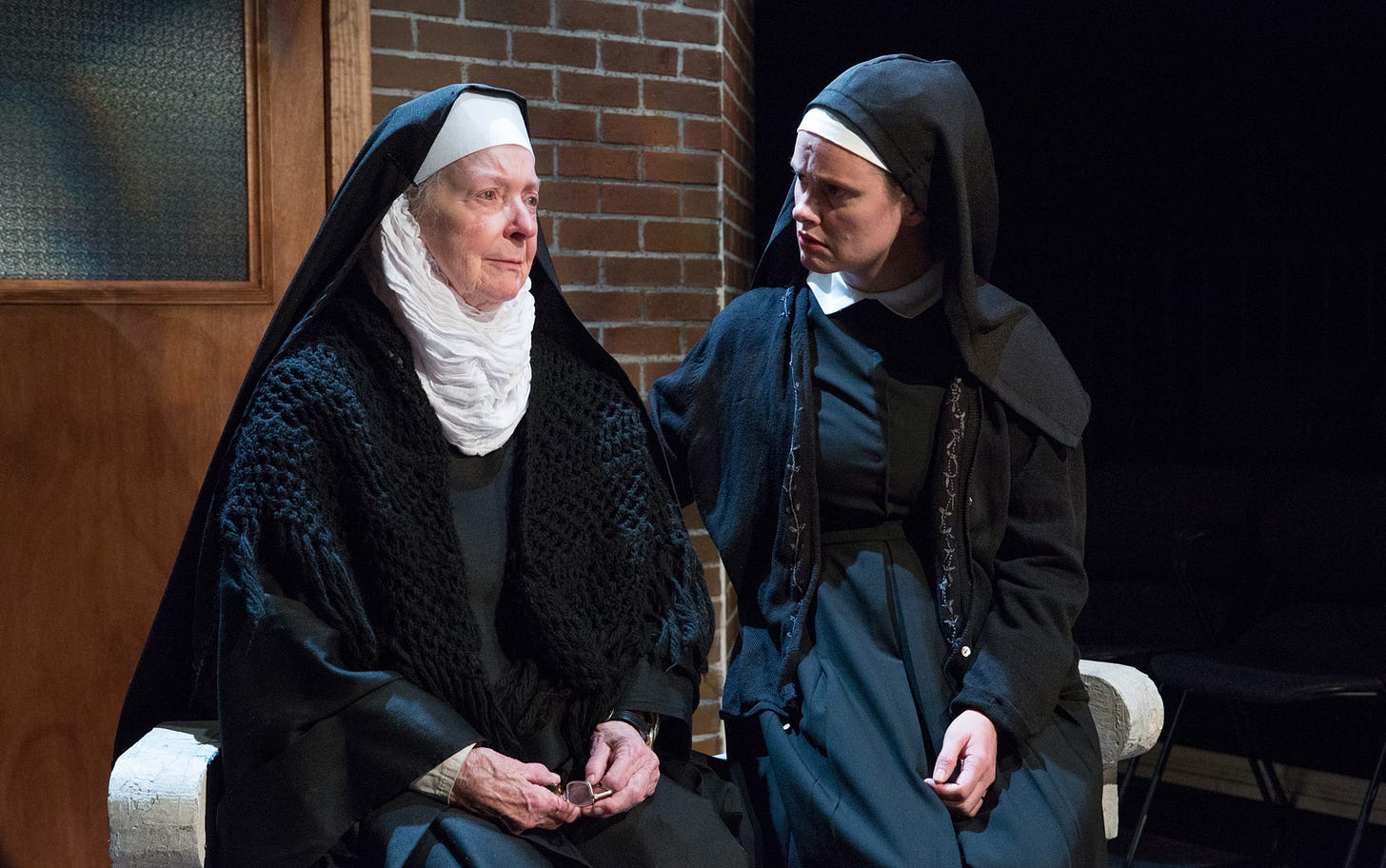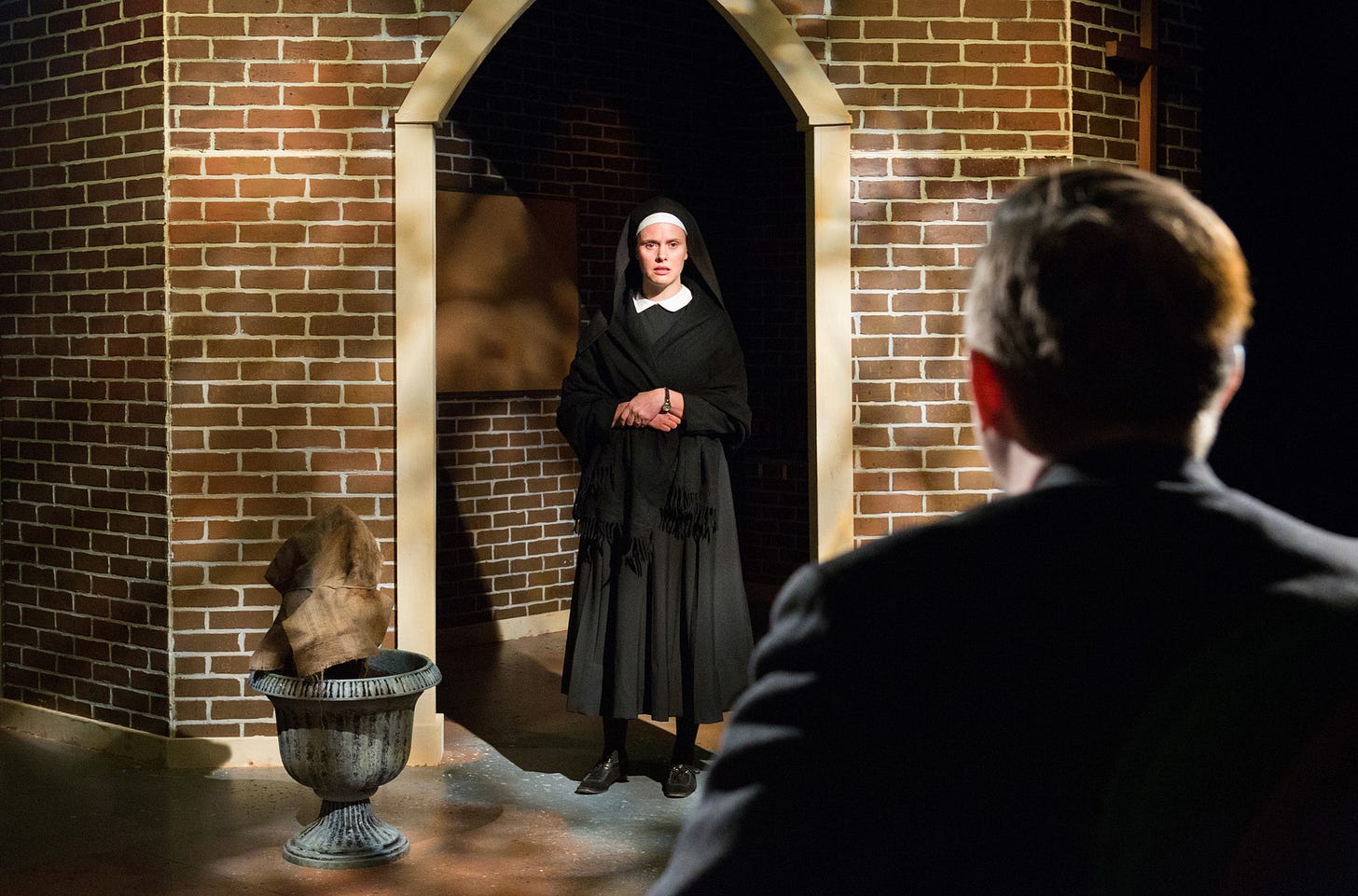
Mary Ann Thebus (left) and Cyd Blakewell
There probably hasn’t been a moment in the nearly 15 years since John Patrick Shanley’s Doubt first bowed that you couldn’t credibly call it “shockingly relevant to our current moment.” It’s a play, after all, that deals with the tension in the Catholic Church over priests abusing their power and being protected by the church’s rigid, male-dominated hierarchy.
If new productions of Doubt were licensed every time new evidence broke regarding bishops or cardinals allegedly covering up accusations of sexual abuse by priests, it would be up there with Shakespeare and A Christmas Carol on the too-common-to-be-counted list; Shanley’s great-great-great-grandchildren could live comfortably off the royalties. The Gift Theatre’s new production held its first preview performance last week at Steppenwolf’s 1700 Theatre three days after Pope Francis ended a Vatican summit on the epidemic with, as a New York Times headline put it, “Strong Words, but Few Actions.” It’s not quite what you might call fortuitous timing, but it’s something.
Shanley’s drama is set in 1964, in a Bronx parish that’s figuring out its place in a post-JFK, mid–Vatican II world. Sister Aloysius Beauvier (Mary Ann Thebus) is the principal of the parish school, and her outlook on the world is decidedly pre–Vatican II. Armed with a fountain pen and a steely sense of moral rectitude, Sister Aloysius puts the fear of God, and herself, into her young charges. That includes Sister James (Cyd Blakewell), a young nun whose enthusiasm for teaching and warmth toward her students show, to the older nun’s eyes, a lack of discipline.

Michael Patrick Thornton (foreground) and Mary Ann Thebus
Sister Aloysius’s hackles have been raised by a progressive young priest, Father Flynn (Michael Patrick Thornton), who’s determined to make the parish feel more welcoming to its neighbors, and who teaches boys’ P.E. at the school. The principal asks young Sister James to keep an eye out for anything unusual; James returns with an inkling of a feeling about something between Father Flynn and the unseen Donald Muller, the first and only black child to have joined the Irish and Italian student body.
Flynn is protective of the boy, Sister James says—maybe he’s taken too much of an interest, in fact. Is Sister James only seeing what Sister Aloysius planted the suggestion she should look for? Is Sister Aloysius’s one-woman crusade against Flynn or the whole structure of the church? Is it possible that Flynn could be acting in the child’s best interest, even without having the child’s best interest at heart? Shanley’s taut morality tale allows for a remarkable number of ambiguities to live alongside Sister Aloysius’s rigid certitude.
Which brings us to the elephant in the Gift’s room. I’ve seen Sister Aloysius played by several actors, including Cherry Jones in the original Broadway production, Meryl Streep in the film adaptation, Kate Skinner at American Theater Company and Karen Janes Woditsch at Writers Theatre. Sister Aloysius can be many things: hard, stubborn, frustrating, pious, devious, haughty, and even a moral relativist when she believes she’s ultimately serving God’s will. What she can’t be, at least until the play’s final resolution, is unsteady.

Mary Ann Thebus and Jennifer Glasse in Doubt at the Gift Theatre Company
Thebus, one of the Chicago acting community’s grandes dames, is experiencing memorization issues as a side effect of a prescription medication. When it became clear during rehearsals that she was having trouble retaining her lines, the Gift team made the decision to go forward with Thebus—a longtime ensemble member who was integral to the company’s founding—occasionally consulting a script as necessary.
That’s the gist of what I was told a few days before Sunday afternoon’s opening performance, but which some audience members only learned from a program insert once they arrived in their seats. (The company posted a version of the program insert’s text to its Facebook page yesterday afternoon.) In practice, at least on Sunday, Thebus was actually reading her lines directly from a sheaf of pages for nearly the entire show. After the performance, I heard from some audience members who hadn’t known to expect Thebus to be on-book and felt they weren’t seeing a fully realized production.
To be perfectly transparent, I wrestled with the question of whether it was really fair—to Thebus and the rest of the company—to review the production at all. I understood the Gift’s rallying behind their fellow ensemble member, and that there was a way to frame this as a brave choice. But to write a review that didn’t acknowledge the situation would feel disingenuous, and to write one that did threatened to let the situation overwhelm the show.

Cyd Blakewell and Michael Patrick Thornton
It was a conversation after the fact with Thornton, who’s also the Gift’s artistic director, that persuaded me I’d be wrong to spike my review—that Thebus’s temporary cognitive impairment shouldn’t preclude her from being seen in this role with her company any more than Thornton’s wheelchair use should stop him from playing roles that aren’t explicitly written for wheelchair users.
So noted. The fact of Thebus’s being on book initially feels like something you’ll stop noticing and just settle into in a few minutes, like reading subtitles or hearing Shakespearean text. And it’s clear that Thebus’s broader faculties aren’t in question; her intention and tone are as sharp as ever.
But there’s an undeniable flattening that comes from one actor reading lines while three others (Jennifer Glasse is the fourth, with one killer scene as Donald’s mother) are fully inhabiting their characters. Thebus is never checked out, but she’s also never fully checked in with Blakewell or Thornton; it’s hard to hold a lesser being in your thrall when you can’t keep up eye contact.
Thebus is a legend in our city, and rightfully so. But the Gift is charging serious ticket prices—around $50 a seat—for an exercise I can’t fully endorse as a full production.
Doubt: A Parable
The Gift Theatre at Steppenwolf’s 1700 Theatre (1700 N Halsted St). By John Patrick Shanley. Directed by John Gawlik.
Cast: Mary Ann Thebus (Sister Aloysius), Michael Patrick Thornton (Father Flynn), Cyd Blakewell (Sister James), Jennifer Glasse (Mrs. Muller).
Designers: Arnel Sancianco (scenic), Mike Durst (lighting), Sanja Manakoski (costumes), Matthew Chapman (sound), Dana Macel (props).
Running time: 1 hour 30 minutes; no intermission. Through March 31. Tickets ($45–$55) at steppenwolf.org.
Photographs by Claire Demos.
Thanks for being an early Storefront Rebellion paid subscriber!
If someone forwarded you this email, and you’d like to support independent, ad-free coverage of Chicago theater, you can sign up as a subscriber right now for 20% off the regular price.
Send your feedback and tips to kris@krisvire.com.




Thank you, Kris. As performing arts (and entertainment) endeavor to include a broader representation of people with disabilities of many kinds, let the conversation continue! Your framing of this issue is thoughtful.